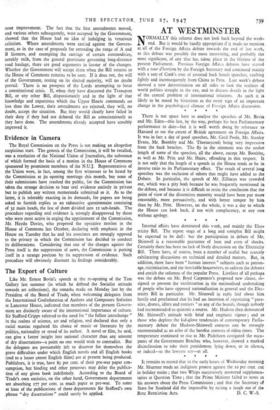AT WESTMINSTER
NORMALLY this column does not look back beyond the week- end. But it would be hardly appropriate if it made no mention at all of the Foreign Affairs debate towards the end of last week, as this debate was possibly the most interesting, and probably the most significant, of any that has taken place in the lifetime of the present Parliament. Previous Foreign Affaics debates have started with a tour d'horizon by the Foreign Secretary and continued mainly with a sort of Cook's tour of assorted back bench speeches, vaulting lightly and inconsequently from China to Peru. Last week's debate showed a new determination on all sides to look the realities of world politics straight in the eye, and to discuss details in the light of the central problem of international relations. As such it is likely to be noted by historians as the overt sign of an important
change in the psychological climate of Foreign Affairs discussion. * * * *
There is not space here to analyse the speeches of Mr. Sevin and Mr. Eden—this last, by the way, perhaps his best Parliamentary performance to date—but it is well worth doing by reference to Hansard to see the extent of British agreement on Foreign Affairs. It was in fact a day of good speeches, Mr. Cecil Poole, Mr. Stanley Evans, Mr. Boothby and Mr. Thorneycroft being very impressive from the back benches. The fly in the ointment was the undue length of some of the speeches, all the above, except Mr. Boothby, as well as Mr. Pritt and Mr. Haire, offending in this respect. It is not only that the length of a speech in the House tends to be in inverse ratio to its Parliamentary effect. The result of several long speeches was the exclusion of others that might have added to the Debate. In particular, the speech of Mr. Zilliacus was crowded out, which was a pity both because he was frequently mentioned in the debate, and because it is difficult to resist the conclusion that the point of view of the dissentient minority would have been put more reasonably, more persuasively, and with better temper by him than by Mr. Pritt. However, on the whole, it was a day to which the House can look back, if not with complacency, at any rate
without apology. * * * * Internal affairs have dominated this week, and mainly the Elec. tricity Bill. The report stage of a long and complex Bill might be expected to be dull: but the participation in debate of Mr., Shinwell is a reasonable guarantee of heat and even of shocks. Certainly there has been no lack of lively discussion on the Electricity Bill. There have, of course, been a number of useful but scarcely exhilarating discussions on technical and detailed matters. But, in addition, there have been " human interest" subjects such as patron- age, victimisation, and the inevitable housewives, to enliven the debates and enrich the columns of the popular Press. Liveliest of all perhaps was the debate on Mr. Boyd Carpenter's proposed new clause, de- signed to prevent the victimisation in the nationalised undertaking of people who have opposed nationalisation in general and the Elec- tricity Bill in particular. Mr. Shinwell in reply laid about him lustily and proclaimed that he had no intention of appointing "para- sites, drones, idlers and rentiers " to any of the boards, though nobody had recommended so quixotic a course. Mr. Hudson then denounced Mr. Shinwell's attitude with brief and emphatic vigour ; and to those who deplore the kid-glove tendencies of contemporary Parlia- mentary debate the Hudson-Shinwell contests can be strongly recommended as an echo of the barefist contests of olden times. The temperature continued to rise as Mr. Pickthom castigated the occu- pants of the Government Benches who, however, showed a marked disinclination to take their punishment lying down, or in silence, or indeed—as the lawyers say—at all. * * * *
It remains to record that in the early hours of Wednesday morning Mr. Shurmer made an indignant protest against the to per cent. cut in holiday trains ; that two Whips successively answered supplemen- taries at Question Time ; that the Prime Minister, failed to score in his answers about the Press Commission ; and that the Secretary of State for Scotland did the impossible by raising a laugh out of tho


































 Previous page
Previous page